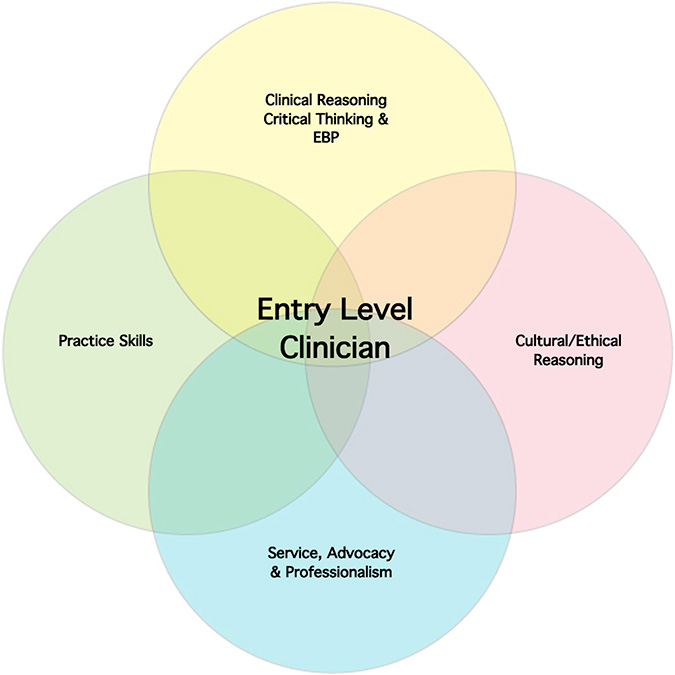
The scaffolding process is evident throughout the courses with learning enhanced each year students are in the program. All courses use a sequence of guided progressive assignments. The didactic nature of science and art courses are enhanced with skill development throughout all the threads of the curriculum.
Clinical Reasoning, Critical Thinking and EBP:
The clinical reasoning, critical thinking, and EBP strand is a diverse but interconnected thread that smoothly transfers throughout the curriculum design of introductory, practice, and mastery stages of knowledge building, coupled with evidence informed decision making, instructional and clinical education skills. The courses under this thread enable students to demonstrate higher-level of thinking and reasoning by assessing and applying scholarly, clinical, and experiential knowledge of anatomy, neurological functions, clinical conditions, research/evidence-based knowledge, gerontology, and the theoretical basis of knowledge that prepares students for practice, instructional knowledge, and informed decision making in occupational therapy. Clinical reasoning coupled with the academic courses of critical thinking create a dynamic interaction towards mastery of knowledge that prepares students for observational and practice stages of fieldwork experience. This dynamic scaffolding culminates in the andragogical approach based principles of academic and clinical education that equips students with the fundamentals of becoming academic and clinical educators, in addition to training competent practitioners.
Practice Skills:
Practice Skills are an integral component within the occupational therapy curriculum leading to the development of competent entry level occupational therapy practitioners. These skills require specific didactics with deliberate practice throughout the progressive sequence of courses. Students receive feedback from faculty, self and others through assignments such as case studies and simulated group protocols. Students enhance their learned skills by teaching others as evidenced through in class activities and presentations. Self-reflection and independent learning are stressed throughout the curriculum. Through the continuum of courses, the curriculum provides a hierarchy of education, enabling students to learn foundational knowledge within courses such as Functional Anatomy, Kinesiology for OT, and Clinical Conditions, integrate and apply new knowledge to diverse individuals, groups, and populations within courses such as Assessment & Intervention of Adult Rehabilitation, Substance Abuse, and Pediatric Theory & Practice and lastly demonstrate mastery of knowledge within courses such as Case Studies, Service Learning & Capstone, and Fieldwork IIA and IIB. This thread also promotes the development of Cultural/Ethical Reasoning, Clinical Reasoning, Critical Thinking and EBP.
Cultural/Ethical Reasoning:
Cultural/ ethical reasoning integrates sensitivity to the unique experiences and identities of groups and individuals, with the 7 core values of occupational therapy (altruism, equality, freedom, justice, dignity, truth, and prudence) to produce an equitable and ethical response to an occupational need. Cultural/ethical reasoning as a curricular thread supports the development of a professional identity in relation to the diversity of individuals, groups and populations served in clinical and community settings. The cultural/ethical reasoning courses situate clinical reasoning and evidence based practice within the philosophical base of occupational therapy supporting both historical and contemporary practice. Further, the courses in this thread orient students toward an ethological understanding of all humans as occupational beings at every age and developmental stage across cultural contexts. This thread includes transformative self-reflection as an andragogical practice to cultivate professionals of compassion, competence, and conscience, as well as didactic coursework and experiential learning to develop the knowledge and skills necessary for promoting the participation, inclusion, and well-being of individuals, groups, and communities. Finally, this curricular thread supports student development contributing to Service, Advocacy, and Professionalism.
Service, Advocacy & Professionalism:
Service, Advocacy, and Professionalism are essential components of our Curriculum Design and are at the core of student’s transformation to entry-level professionals. This is an interactive process between the students and their experiences, inclusive of didactic coursework, experiential learning, and interactions on all levels while in the program. A series of curricular experiences are embedded in the professional development courses including interprofessional experiences, advocacy assignments, interpersonal skills, leadership abilities and the ability to reflect on professional and ethical standards. Students also partake in Level 1 fieldwork 1A, 1B, and 1C to enhance their knowledge base and promote effective communication skills used with patients and professionals. The Professional Development courses offer a reflective look on clinical competence to monitor and develop professional behaviors, service and soft skills of practice. An emphasis is placed on lifelong learning with strategies to prepare for ethical and professional standards. Students participate in designing a unique OT practice incorporating all elements of service, professionalism, and advocacy. Students culminate their experience with a service learning Capstone to explore the theory/practice of citizenship and apply community involvement. Extracurricular activities related to advisement and advocacy for the profession, such as Lobby day, AOTA membership, and participation in annual AOTA conferences are examples that further support this cultural shift in our students.

